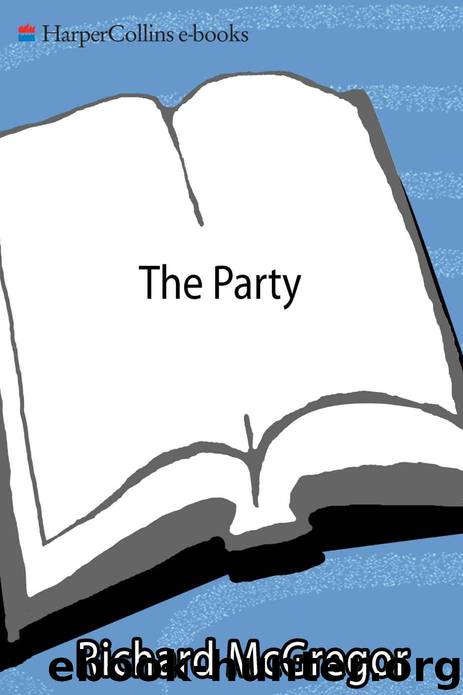The Party: The Secret World of China's Communist Rulers by Mcgregor Richard

Author:Mcgregor, Richard [Mcgregor, Richard]
Language: eng
Format: mobi
Publisher: Harper Collins, Inc.
Published: 2010-06-07T16:00:00+00:00
Shanghai had been fêted in colonial times as the Pearl of the Orient, a mercantilist and mercenary trading hub where it was ‘hard to know where the government ended and gangsterism began’. When Mao’s sandal-clad army marched into the city in 1949, they cast a cold eye on the freewheeling entrepot. Branding Shanghai the ‘whore of imperialism’, the communists submitted the city to a lengthy punishment, closing private businesses and locking up, or banishing, entrepreneurs, gangsters and foreigners alike. By the mid-sixties, history had turned full circle. Shanghai, once a gangsters’ paradise, had become the stronghold of the Party’s ultra-radicals. The spell that these two contradictory political currents cast over the city was not broken until 1989. The Shanghai that these days dazzles foreigners and local out-of-town visitors alike ironically owes its resurgence to the military suppression of the demonstrations in Beijing and other cities across the country that year.
Mao and his third wife, Jiang Qing, had used a clutch of radicals from Shanghai to launch the Cultural Revolution in 1966, their putsch against their chairman’s party rivals in Beijing. The ‘Gang of Four’, as Jiang Qing and her three cronies from the city came to be known, radicalized the economy and the arts. When Mao died, they tried to extend their power over the entire central government. Even after the Gang of Four were outmanoeuvred and arrested in Beijing in October 1976, the Shanghai party committee tried to fight on, mobilizing local militia groups to stage an armed insurrection against the incoming regime in Beijing. The city’s bosses backed down only when Beijing prepared a military counter-action, and Shanghai’s own residents, tired of their ultra-leftist leaders, took to the streets to support the new central government.
A newly chastened Shanghai was retooled by the Party into a bastion of state industry and forced to remit any profits generated by its enterprises to the central government in Beijing, much as had happened in the fifties, leaving nothing for reinvestment at home. In 1983 alone, Shanghai remitted more to the central government in taxes than it had received in investment from Beijing in the entire previous thirty-three years. Shanghai stagnated under Beijing’s thumb for more than four decades, until the early nineties, when politics intervened again, this time in its favour.
Deng Xiaoping, searching for a way to revive the national economy and fend off his left-wing critics in the wake of the Tiananmen massacre, produced the city as his trump card when he returned to the political stage on his 1992 southern tour. Deng lamented that his big mistake in the late seventies had been not to include Shanghai in the first batch of areas allowed to develop the market economy. More than a decade after Deng’s policies had been pioneered in southern China and elsewhere, Shanghai was finally let off the leash.
Shanghai’s leaders inherited a city in the early nineties with a great commercial history that had been emptied of commerce. They wasted little time in getting back into the game. In the decade from 1992, the city roared back to life, spurred by decades of pent-up demand.
Download
This site does not store any files on its server. We only index and link to content provided by other sites. Please contact the content providers to delete copyright contents if any and email us, we'll remove relevant links or contents immediately.
| Anarchism | Communism & Socialism |
| Conservatism & Liberalism | Democracy |
| Fascism | Libertarianism |
| Nationalism | Radicalism |
| Utopian |
The Secret History by Donna Tartt(16681)
The Social Justice Warrior Handbook by Lisa De Pasquale(11495)
Thirteen Reasons Why by Jay Asher(7810)
This Is How You Lose Her by Junot Diaz(5805)
Weapons of Math Destruction by Cathy O'Neil(5058)
Zero to One by Peter Thiel(4841)
The Myth of the Strong Leader by Archie Brown(4797)
Promise Me, Dad by Joe Biden(4462)
Beartown by Fredrik Backman(4446)
How Democracies Die by Steven Levitsky & Daniel Ziblatt(4430)
Stone's Rules by Roger Stone(4427)
The Fire Next Time by James Baldwin(4357)
100 Deadly Skills by Clint Emerson(4095)
A Higher Loyalty: Truth, Lies, and Leadership by James Comey(4045)
Rise and Kill First by Ronen Bergman(4029)
The David Icke Guide to the Global Conspiracy (and how to end it) by David Icke(3900)
The Farm by Tom Rob Smith(3884)
Secrecy World by Jake Bernstein(3793)
The Doomsday Machine by Daniel Ellsberg(3743)
